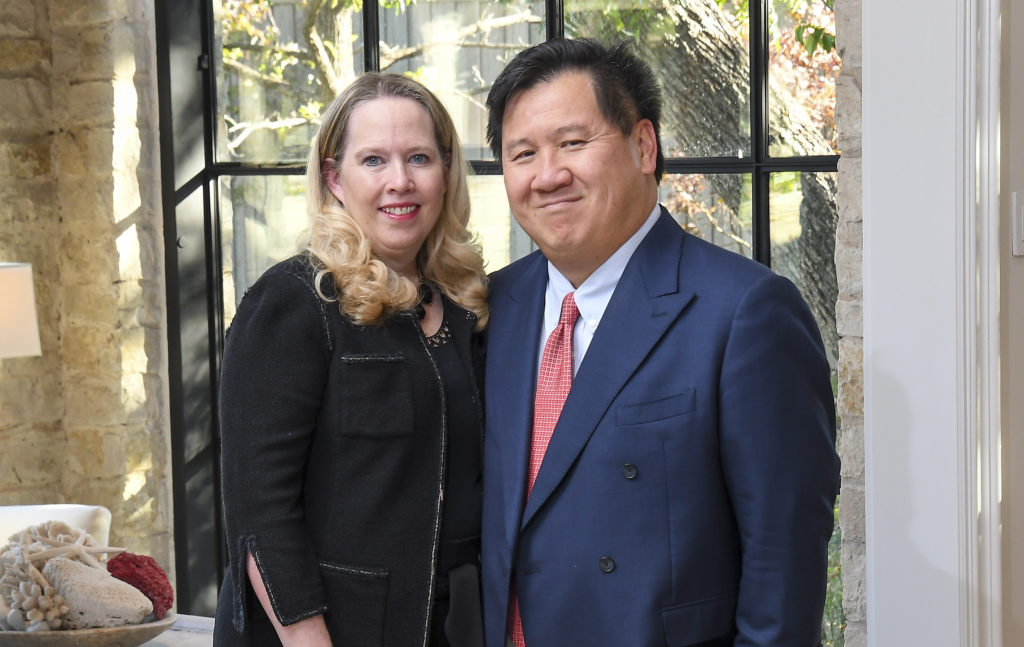
Allyson and Judge Jim Ho at their Dallas home
On his desk at the Earle Cabell federal building in Dallas, Judge Jim Ho keeps a stone – one of the stones that nearly totaled his North Dallas house on October 20, 2019 when a ferocious tornado ripped through the neighborhood.
His wife Allyson was able to wrangle their nine-year-old twins and two dogs out of the house as the tornado hit, and all was well. “We left the house with the clothes on our backs,” Allyson said. But they met most of their professional engagements nonetheless. Soon after the tornado, Jim participated in a CLE program at the Belo Mansion in Dallas wearing a tee-shirt and shorts.
With the help of friends and colleagues, they rented a temporary house. It wasn’t until August 2020 that the Ho family was able to return to their own refurbished home.
The stone, Jim told The Texas Lawbook in an exclusive interview, is a “sort of remembrance” for his family. “I keep it as a daily reminder that if our home can survive an EF3 tornado, our family can survive anything,” he said.
In other ways, the Ho family has survived multiple whirlwinds in the last few years, as Jim moved from Gibson, Dunn & Crutcher to the U.S. Court of Appeals for the Fifth Circuit in January 2018; and Allyson, a few months later, took over her husband’s office at Gibson Dunn.
“They only had to scratch off the first name on the nameplate,” she laughed.
As a Trump appointee, Jim Ho has been targeted and praised for his opinions and dissents. A Slate reporter who has been critical of Republican-appointed judges called Ho “qualified for the job” early in his tenure, but he wrote more recently that Ho’s opinions “resemble Rush Limbaugh’s most incoherent rants.” In September 2020, President Donald Trump put Jim on his list of possible Supreme Court nominees, but the phone call did not come.
To be sure, Judge Ho has not always fallen in line with fellow conservatives on the Fifth Circuit and he has not hesitated to be critical of fellow judges in his written opinions.
In a decision issued on December 21, he and liberal appellate judge Stephen Higginson sided with an employee in a Fair Labor Standards Act case that has outraged oil and gas executives. It was the fourth time in two years that Judge Ho ruled in favor of a worker over an employer in an FLSA case.
Judge Jacques Wiener Jr., the third judge on the panel and a George H. W. Bush appointee for whom Allyson Ho once clerked, sharply dissented from Judge Ho. With a nod to Shakespeare’s Macbeth, Wiener intimated that a concurrence Ho wrote in the case was “full of sound and fury, signifying nothing.” Ho responded, “As the adage goes, the loudest voice in the room is usually the weakest.”
Allyson, for her part, has notched more than 60 appellate arguments, including four before the U.S. Supreme Court, and co-chairs the Gibson Dunn’s nationwide appellate and constitutional law practice group. “I couldn’t be happier,” she says. She was involved in the recent nomination of Amy Coney Barrett for the Supreme Court, gathering more than 200 “women who practice our faith as well as the law” to sign a letter urging the Senate to confirm her nomination. Allyson and Jim are evangelical Christians.
Sesame Street’s Impact
Rob Walters, partner-in-charge of the Gibson Dunn Dallas office, raved in 2018, “Allyson and Jim are legal royalty in Texas.”
If that’s the case, where did the lineage begin, and how did it evolve? Allyson and Jim – he goes by Jim with people he’s known before donning the robe – agreed to extensive interviews with Texas Lawbook over several months to reveal their remarkable story.
Born in Taipei, Taiwan in 1973, Jim Ho and his family – his father was a doctor – came to America “for one simple reason: America really is the land of opportunity. I was not born an American, but I thank God every day that I will leave this earth an American.” Ho learned English from watching Sesame Street and was naturalized on May 14, 1982. (For Christmas this year, Allyson and the children gave the judge a Sesame Street Lego set.)
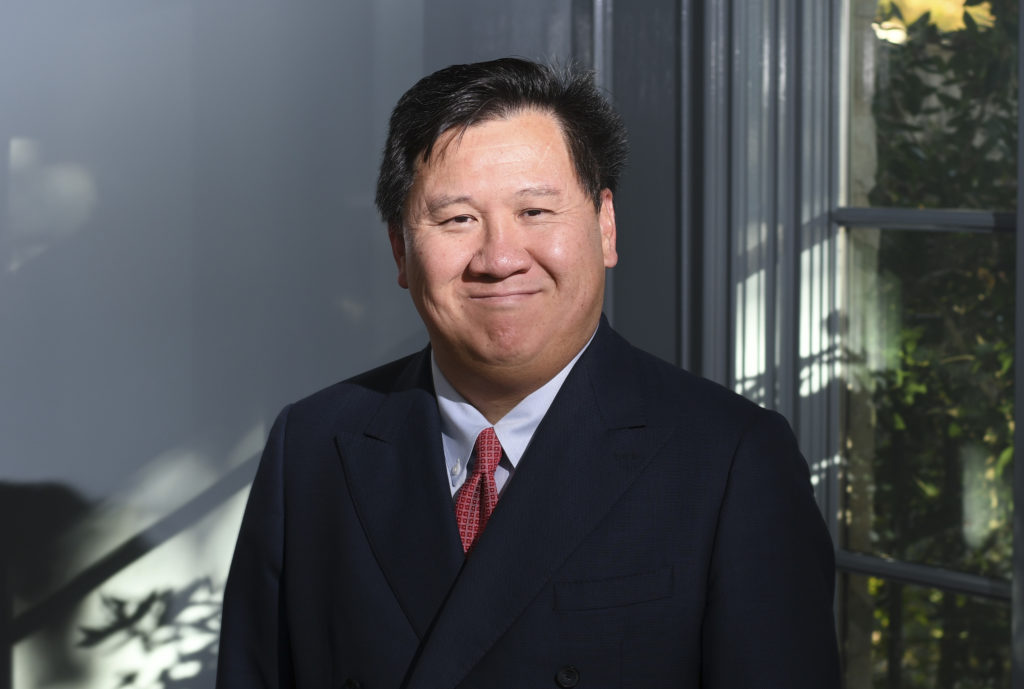
Asked who his favorite Sesame Street character was, the judge responded, “I vaguely recall being partial to Big Bird. Maybe it’s because I was short and wanted to be tall like him. I probably also liked the idea that Big Bird was right and the grownups were wrong about his friend Mr. Snuffleupagus.”
He grew up in Pasadena, California and played football throughout high school, going by his coach’s adage that “football is 85 percent desire and 15 percent talent.” Jim, who has a self-deprecating sense of humor, said, “I had no athletic ability.”
Jim went to Stanford University for undergraduate and won his Juris Doctor with high honors from the University of Chicago Law School in 1999. In 1999 and 2000, he clerked for Judge Jerry Smith at the Fifth Circuit where he ultimately became a judge himself. He also clerked for Justice Clarence Thomas in 2005 and 2006.
Asked if he experienced racism during his life and career, Ho responded candidly: “Sure, not only as a minority on the playground as a young child, or as the kid who always brought weird food to school, but also as a member of the legal profession, receiving racist hate mail for positions I’ve taken at various stages in my career.” When Ho opined years ago that John McCain and Barack Obama were eligible to be president as natural born citizens, he received letters calling him “Chinaman” and a “non-white person [who has] no civil or constitutional rights yet.”
Jim is the first Asian American to serve on the Fifth Circuit and is currently its only immigrant. Every May, he presides over a naturalization ceremony in the Northern District of Texas.
Allyson began on a different path that ultimately merged with Jim’s. She was born and raised in Houston by her father, an architect, and her mother, a writer. Not surprisingly, she loved the written word. Her mother had to make her put down her books to go out and play, Allyson said. She played piano and harp in junior high and high school, and kept up with the harp even as she clerked at the Supreme Court in 2002 and 2003 for Justice Sandra Day O’Connor.
“I got to play for some of the justices during my clerkship when she arranged a clerk recital,” she said.
Allyson did not gravitate toward law school at first. She graduated from Duke University magna cum laude with a B.A. in English, Rice University with an M.A. and Ph.D. in English Literature. But her love of writing drew her toward the law, and she got her J.D. at the University of Chicago Law School with high honors. She also clerked for Judge Wiener in 2000 and 2001.
Textualism Rules How They Met
Jim and Allyson disagree somewhat about when they first met. Allyson was a one-L at Chicago and recalls that when she was part of a study group Jim, then a two-L, came in to share his outlines with the group. “That is how we met all right, yep,” Allyson said.
Jim agreed that “as a textualist, my answer is that we may have been in the same room” that Allyson mentioned. “But the first time we met was not until a few weeks later at a Federalist Society event.”
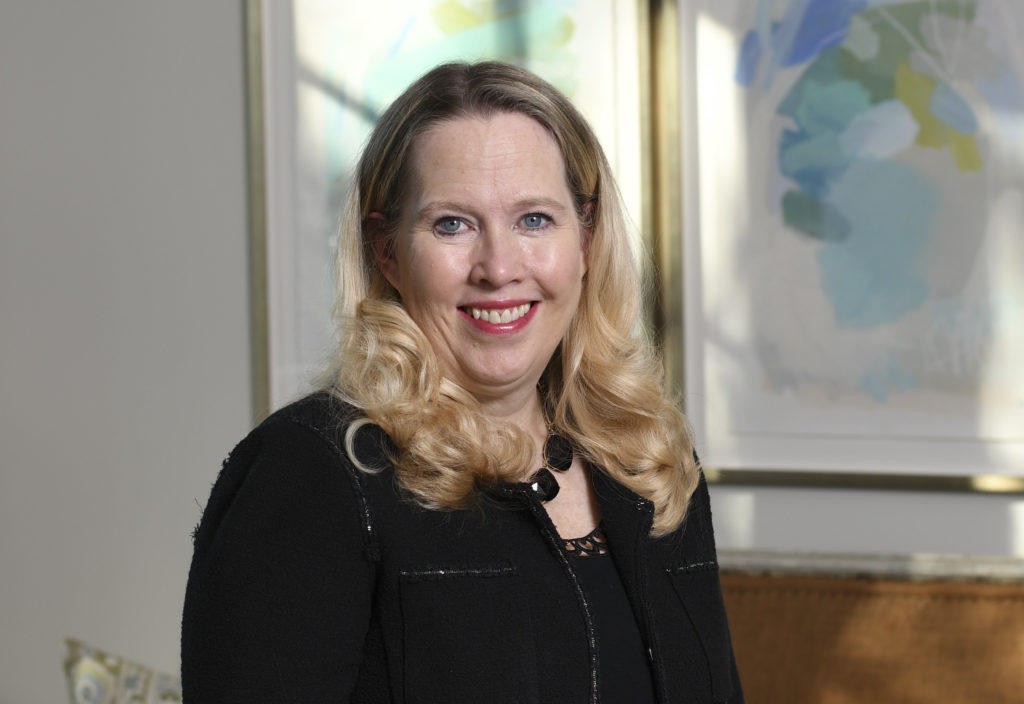
They did not date until a few years later, and married in 2004.
They did tours of duty in Washington, DC., mainly during the George W. Bush administration. They also honed their appellate skills, preparing for what came next.
“I was a college English professor before I went to law school,” Allyson said. Appellate law, she added, enabled her to “help people solve really difficult problems, yet keep my passion for writing and thinking and analyzing really knotty complex issues.”
Jim agreed. “Achieving excellence in appellate law requires academic excellence and intellectual rigor.”
SCOTUS Beckons
They moved to Dallas in 2006, and Allyson joined Baker Botts, while Jim went with Gibson Dunn. R. Ted Cruz, then Texas solicitor general, soon helped shape their future. Jim succeeded Cruz in the SG position in 2008 after Cruz went to Morgan, Lewis & Bockius.
As Texas solicitor general, Ho argued and won one case before the high court – Sossamon v. Texas, involving religious rights for prisoners — and chalked up several other un-argued victories for the state. Allyson also went to Morgan Lewis from 2008 to 2018. She argued four Supreme Court cases in three years while at Morgan Lewis, a large number at a court where few women in private practice rise to the lectern.
“Becoming a Supreme Court litigator wasn’t something I aspired to,” Allyson said, “but of course it’s the thrill and honor of a lifetime to argue there even once, let alone multiple times.”
Cruz and fellow senator John Cornyn both played a role in Jim’s nomination for the Fifth Circuit. He could have continued in private practice, but when they asked if he was interested, Jim recalls telling them, “I was sure they would have many great people to choose from, but if they wanted to consider me, I would be profoundly honored, and it would not be in my DNA to say no if they were to ask.”
They asked, and he said yes.
Musical Chairs
Allyson was okay with Jim’s decision to take the bench, which also cleared the way for her to return to Gibson Dunn, this time as co-chair of the firm’s nationwide appellate practice, the same position that Jim left. She had been a summer associate after her second year at law school.
“I was of course tremendously proud of him, and for me having the opportunity to go to Gibson, it was really a homecoming,” she said. “It felt like family to me.”
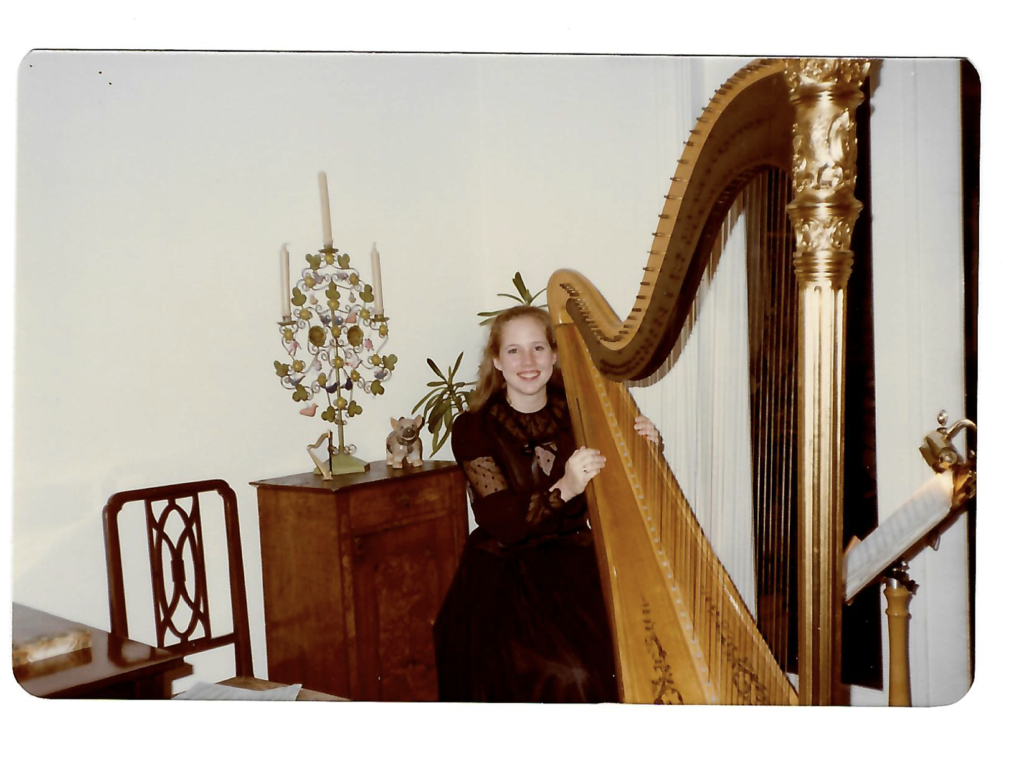
With all of their professional moves, Jim and Allyson can boast they have touched the same base five times: they both went to Chicago for law school, both clerked on the Fifth Circuit, both clerked at the Supreme Court and both co-chaired the Gibson Dunn appellate practice. To boot, they also both served as co-chairs of the Federal Judicial Evaluation Committee, appointed by Texas senators to assess federal judiciary and U.S. attorney appointees.
At Gibson Dunn, Allyson has handled cases involving issues ranging from business disputes to religious liberty to victims’ rights. “This past year, I’ve had the really meaningful opportunity to work with Professor Paul Cassell at S.J. Quinney College of Law at the University of Utah, the nation’s foremost victims’ rights advocate, to file a series of amicus briefs on behalf of crime victims, their surviving family members, and the non-profits who support them,” Allyson said.
Allyson, who is 54, is also mentoring “the next generation of appellate rock stars,” she said, in part to boost the presence of women in appellate practice. “We were very happy to welcome Jessica Wagner and Elizabeth Kiernan back to the firm — Jessica after clerking for Justice Alito, and Liz after clerking for Chief Judge Pryor on the Eleventh Circuit. Liz was with us for a year between her clerkships for Judge Smith on the Fifth Circuit and Judge Pryor. I look forward to watching their stars rise.”
Jim, now 47, has also been working with up-and-coming legal talent.
“To me, by far the best part of being a judge is getting to spend time with my clerks,” he said. “Every year, I get to know four brilliant young legal minds who are excited about the law, excited about the Constitution, publicly spirited, and just want to make a positive difference in the future of our country.”
Fifth Circuit chief judge Priscilla Owen has known Jim and Allyson since before they were married.
“He appeared before me and was an outstanding appellate advocate. It was certainly no surprise that he was tapped to become a judge on the Fifth Circuit,” Owen said. “It is a pleasure and a privilege to serve with him. On a personal note, he is a devoted husband and father. One of my favorite Christmas cards of all time came from the Ho family. It had ‘Ho Ho Ho Ho’ embossed across the front with photos of Jim, Allyson and the twins.”
Who is More Conservative?
Which of Allyson and Jim is more conservative, and which is the better writer? When asked, they gave cryptic answers. “Jim has always been the model of everything I aspire to be as both a lawyer and a person,” Allyson said. And Jim said, “She’s better than me in every possible way. I still can’t believe she agreed to marry me. Nor can her friends, I’m sure.”
Privately, close friends say Allyson is more conservative and Jim is more libertarian. But both have connections to friends and current or former colleagues who are not known as conservatives.
Gibson Dunn partner Theodore Boutrous Jr., who has litigated against Trump on First Amendment issues, is a longtime friend.
“I knew Jim was a superstar destined for greatness from the moment I started working with him when he was an eager summer associate in our Washington D.C. office. He combined brilliance with curiosity and decency and vision, plus a sense of humor,” Boutrous told The Texas Lawbook. “I admired Allyson from afar when she was a formidable competitor. When she joined the firm as a partner after Jim left for the Fifth Circuit, it was like destiny. They are the ultimate legal power couple but they don’t act like it. They just get the job done, with excellence, exuberance and humility.”
Asked about the quality of Fifth Circuit advocates, Jim said that when he first came to Texas, he was told that there was not much of an appellate bar, other than Ted Cruz and the late Greg Coleman. “Now there is a generation of rising Texas appellate stars like Scott Keller and Kyle Hawkins and so many others,” Jim said. “The future looks very bright for the Fifth Circuit appellate bar.”
Ignore Fans Who Boo
Jim has generated mixed headlines and commentary with his decisions and dissents since joining the Fifth Circuit.
In a February decision, Ho dropped a footnote suggesting that a lawyer in the case should be sanctioned not just for sloppy spelling but for prejudicial homophobic comments, including a sentence implying that a school principal’s search of a student’s pockets for contraband could be more offensive if the school official was gay. It won praise on social media, though one rather backhanded Twitter compliment was, “Did Judge Ho Just Do Something Good?”
Jim shrugs off the criticism he has experienced.
“Refs are supposed to ignore fans who boo. I’ve always been taught that people in the legal profession should do the same,” he said. He points to two letters framed in his office: one in which he stopped working for a client who kept refusing his advice, and the other a letter from the same client who hired him back. “I keep those letters to remind me that you should just do what you think is right, and things will work out one way or another.”
Have their similar paths caused any ethical issues, such as recusals in cases they may both be involved in?
“No impact as a substantive matter,” Allyson said, though her former clerkship and familiarity with Fifth Circuit judges makes for awkward moments. “It’s been a little weird to have several members of the court ask me to call them by their first name in social interactions, which is really nice, but feels a little strange.”
She worries that she might inadvertently call a judge by his or her first name during arguments, which would not be a good idea. “In the history of lawyer foibles, I do not want to add another chapter to that volume,” she said.
Jim says that “any matter that was Morgan Lewis when Allyson was there and at Gibson Dunn now, I obviously recuse – not just her but anything involving the firm. Of course, that was already true because I was a former Gibson Dunn partner.” In April 2019, the Fifth Circuit struck an amicus brief filed by Gibson Dunn in an Affordable Care Act case, presumably because it would have caused Jim to recuse himself.
Jim also offered that “we’re far from the only married couple with this dynamic of a spouse on a court and another who practices regularly before the other judges on that court.” Judge Catharina Haynes, he said, “obviously dutifully recuses” when her husband Craig Haynes and his firm Thompson & Knight are before the Fifth Circuit. Other examples include Chief District Judge Barbara Lynn of the Northern District of Texas and her husband, Dallas trial lawyer Mike Lynn, and Gibson Dunn partner Veronica Lewis who recently married Dallas District Judge Eric Moyé.
RBG and ACB
Allyson and Jim were asked for their thoughts about the passing of Justice Ruth Bader Ginsburg on September 18, 2020, and the confirmation of Amy Coney Barrett, her successor, on October 27.
In response, as a sign of how intertwined Allyson and Jim are, they made comparisons with each other.
“Those of us who were blessed to clerk on the court and to argue before it while she served really grieve her loss,” Allyson said. She met Ginsburg’s husband Marty during her clerkship and said, “I’m blessed because Jim is my Marty. Just the support and the love are really what sustains me.”
Jim also praised justice Ginsburg. “Like her dear friend, Justice Scalia, Justice Ginsburg was a giant in the law well before she ever took the bench,” Jim said. “Also like Justice Scalia, she reminds us of an era where you could take bold stances in your legal career, and still be confirmed overwhelmingly by the Senate.”
Jim is also enthusiastic about Barrett.
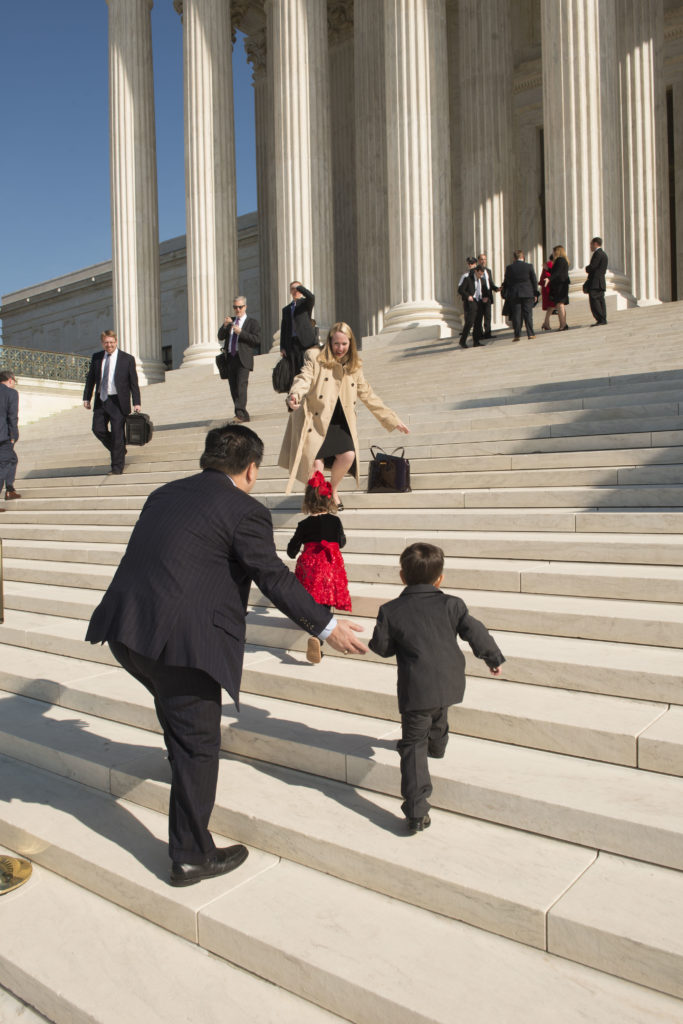
Allyson, Jim and twins at the U.S. Supreme Court
“Honestly, she reminded me of Allyson,” he said. “Two women who just seemed amazing at everything that they do. Amazing in their legal careers. Amazing mothers to their children. Amazing role models for kids and young lawyers everywhere.”
As for Allyson’s role as a lawyer, Jim added, “During my Senate confirmation hearing, Senator Cruz went out of his way to mention that I’m only the second-best appellate lawyer in my own home. Of course, he’s absolutely right.”
A Sample of James Ho’s Fifth Circuit Opinions:
— Hewitt v. Helix Energy Solutions Group, December 2020. In a Fair Labor Standards Act case affecting oil and gas companies, Ho sided with employees over when they should be exempt from overtime payments. The decision replaced an earlier opinion in the case. Judge Stephen Higginson joined Ho, but Judge Wiener dissented sharply, urging a further en banc review because Ho’s opinion, if it stood, would have “devastating effects on all employers, especially in the oil and gas arena.” Wiener cited Shakespeare’s Macbeth suggesting that Ho’s opinion was “full of sound and fury, signifying nothing.” In a concurrence responding to the dissent, Ho wrote, “The dissent begins by expressing due respect to the majority—and then ends with a well-known literary quote about idiots. It concludes that my opinion in this case is worth ‘nothing.’”
— S.O. v. Hinds County School District, February 2020. In a Fourth Amendment case brought by the parent of a 12-year-old student whose pockets were searched for contraband candy, Ho wrote for himself and judges Patrick Higginbotham and Kurt Engelhardt, Ho added a solo footnote criticizing the student’s lawyer for filing a frivolous appeal and “countless misspellings and grammatical errors” in her briefs. The briefs intimated that the official who searched the student was gay, which led Ho to also say that the briefs “also appear to appeal to prejudice.” The lawyer apologized, and the opinion was withdrawn.
— Winzer v. Kaufman County, October 2019. A majority of the en banc Fifth Circuit denied a rehearing in a qualified immunity case involving a police shooting of a Texas youth. Joined by judges Jerry Smith, Edith Clement and Kurt Engelhardt, Ho dissented, stating that “we have no business … second-guessing split-second decisions by police officers from the safety of our chambers.”
— U.S. v. Taffaro, March 2019. The three-judge panel affirmed a sentence of probation and fine for a Louisiana law enforcement official convicted on several tax evasion and false filing claims. In a concurrence joining judges Edith Clement and Priscilla Owen, Ho disapproved of the lenient sentence, stating that it would “only further fuel public cynicism and distrust of our institutions of government.”
— Gibson v. Greene, March 2019. In a case brought by a Texas inmate who sought sex reassignment surgery, Ho wrote a majority opinion that “It can be cruel and unusual punishment to deny essential medical care to an inmate, but that does not mean prisons must provide whatever care an inmate wants.” He was joined by Judge Jerry Smith. Judge Rhesa Barksdale dissented.
— Zimmerman v. City of Austin, April 2018. Ho’s first opinion on the Fifth Circuit was a dissent from denial of rehearing en banc in a First Amendment campaign contribution case. Joined by Judge Edith Jones, Ho spoke against limits on campaign donations. “If there is too much money in politics, it’s because there’s too much government,” Ho wrote. “The size and scope of government makes such spending essential.”
Allyson Ho’s U.S. Supreme Court arguments while at Morgan, Lewis & Bockius
— Oil States Energy Services LLC v. Greene’s Energy Group, LLC, November 2017. By a 7-2 vote, the court turned back a constitutional challenge to inter partes review, the administrative procedure for challenging patent validity at the U.S. Patent and Trademark Office. Ho represented Oil States Energy, the losing party.
— McLane Company, Inc. v. E.E.O.C, February 2017. In a 7-1 ruling the court said federal appellate courts should review challenges to an EEOC subpoena under the deferential “abuse of discretion” standard. Ho represented McLane Company, the winning party.
— Perez v. Mortgage Bankers Association, December 2014. The U.S. Supreme Court ruled unanimously that federal agencies do not need to seek public comment when they change their interpretation of their own rules. Ho represented Mortgage Bankers Association, the losing party.
— M&G Polymers USA, LLC v. Tackett, November, 2014. At issue was whether retiree health benefits “vest” indefinitely when a collective bargaining agreement is silent on the point. The U.S. Court of Appeals for the Sixth Circuit said yes, but the Supreme Court said no unanimously and remanded the case. Ho represented M&G Polymers, the winning party.
